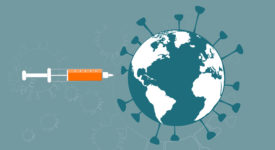A third wave of infections is now inevitable unless citizens and legislators are “disciplined”, the World Health Organization (WHO) has warned, saying a 10-week decline in new coronavirus infections across Europe has now come to an end. The number of new cases across Europe rose by 10% last week, the UN health agency’s regional director for Europe Hans Kluge told the media on Thursday (1 July). Kluge said the uptick in infections was driven by increased mixing, gatherings, travel, and easing of social restrictions, as countries throughout the region edge out of lockdown measures. “This is taking place in the context of a rapidly evolving situation. A new variant of concern – the Delta variant – and in a region where, despite tremendous efforts by member states, millions remain unvaccinated,” he said, citing the strain first discovered in India.
“There will be a new wave in the WHO European region unless we remain disciplined,” said Kluge, warning the highly infectious Delta variant was on track to become the dominant strain in WHO’s Europe region by August. Meanwhile, two doses of COVID-19 vaccine appear to provide protection against the rapidly spreading Delta variant of the coronavirus, according to the EU agency in charge of the evaluation and supervision of medicinal products. “It seems the four vaccines approved in the European Union are protecting against all the strains circulating in Europe, including the Delta variant,” the head of vaccine strategy at the European Medicines Agency, Marco Cavaleri, said on Thursday (1 July). The EMA has so far approved Pfizer/BioNTech, Moderna, AstraZeneca and Johnson & Johnson vaccines.
The overal picture across Europe in July concerning the summer holiday is still optimistic but becoming a little more complicated than last month. More and more countries are open but the threat of the Delta variant looms. This means that for the travel industry, it has once again become a race to get second vaccinations (and first) completed, before the Delta variant becomes prevalent across the bloc–particularly as it is more transmissable and vaccine resistant than previous strains. The European travel industry is currently in good shape, with the EU having expanded its White List of countries, the third-party countries that can now visit Europe, including the U.S., Australia, Israel, Japan, New Zealand, Singapore, South Korea, Taiwan and Thailand. Moreover, every European country is ready to use the EU Digital COVID Certificate from 1 July onwards as the way forward to ease travel across Europe this summer. Also, more EU countries are open to fully-vaccinated travelers, with France, Austria, Norway and Belgium having opened their borders to everyone in June whilst Finland and Latvia opened to fully vaccinated Europeans.
Article Tags:
AstraZeneca · coronavirus · Hans Kluge · Johnson & Johnson · lockdown · Marco Cavaleri · Moderna · Pfizer · vaccine · WHO · World Health OrganizationArticle Categories:
INSTITUTIONS & POLICY-MAKING






